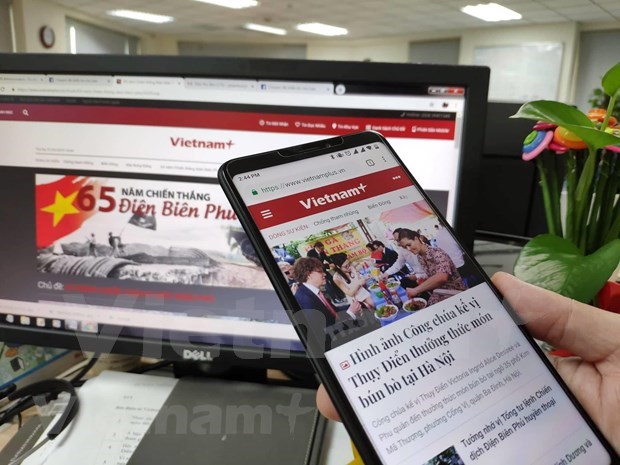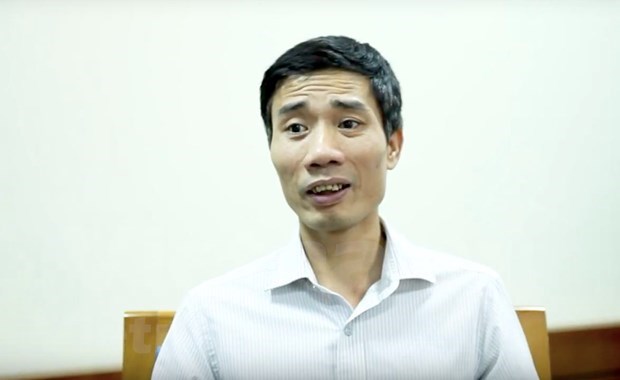Consumption tax on mobile: contrary to practice
 Illustrative image (Source: Vietnam+)
Illustrative image (Source: Vietnam+)Hanoi (VNA) - The proposal of imposing consumption tax on mobile phones, according to experts, is both contrary to common practice, as well as the characteristics of goods subject to special sales tax.
Even, these proposals, according to economist Nguyen Thanh Binh, are essentially a “take-all” move.
VietnamPlus e-Newspaper correspondent had an interview with Dr. Nguyen Thanh Binh from the Institute of Policy and Development on this issue.
- Ho Chi Minh City has just proposed special consumption tax on a number of goods and services such as mobile phones, cameras, perfumes, cosmetics, game business and plastic surgery services. What do you think about this proposal?
Dr. Nguyen Thanh Binh: Special consumption tax must be imposed on luxury goods to discourage consumption of which is not encouraged because they adversely affect the environment and require a large amount of money for import. For example, many countries apply special taxes on automobiles as they are both a luxury and have environmental impacts.
However, when special consumption taxes are applied, the analysis must clearly indicate the adverse effects. For example, alcohol and tobacco adversely affect the health; the community needs special consumption tax.
In addition, the special consumption tax should be consistent with the practices of countries around the world. For example, when taxing cell phone, you have to consider.
The question is whether the mobile phone is an essential or luxury goods; does it affect the environment or people’s health? In my opinion, this is a normal consumer product and cannot be subject to special consumption tax.
Only when people prove that this is a luxury and expensive product and the government discourages the use of phone can the authorized agencies consider applying the special tax. Meanwhile, the Government provides necessary means for mobile phone subscribers which mean the imposition of special tax on mobile phone is inappropriate.
Therefore, this proposal is both contrary to the common practice and contrary to the characteristics of the goods subjected to special tax.
 Dr. Nguyen Thanh Binh, Institute of Policy and Development. (Photo: Vietnam +)
Dr. Nguyen Thanh Binh, Institute of Policy and Development. (Photo: Vietnam +)- However, Ho Chi Minh City stated that although mobile phones are essential goods, they need to apply tax to regulate the income of middle income earners and above. What do you think about this analysis?
Dr. Nguyen Thanh Binh: This is wrong. For regulating income, we should use personal income tax.
Special consumption tax is set up to limit the consumption of an item that adversely affects the living environment or socio-economic development.
In my opinion, the motivation here is to increase the budget. We have to look at the nature of the problem and maybe Ho Chi Minh City is short of budget, not enough to afford development. However, with this proposal, I disagree with the rampant taxation.
- What about other items, like perfume or plastic surgery services? Is the proposal reasonable?
Dr. Nguyen Thanh Binh: Some countries has applied taxes on perfume. In fact, perfumes are not essential goods. If essential goods are not available, it will seriously affect life, for example without mobile phones, it will greatly affect the lives of many people.
Plastic surgery services, in my opinion, should not be included in the list of goods subject to special tax. When cosmetology establishments pay the full value-added tax, we have already collected a full tax from them.
Not to mention, collecting taxes with orthopedic medical examination and treatment facilities needs consideration as this issue is also related to the humanitarian factor.
- So, in your opinion, what are the suitable areas for increasing tax collection?
Dr. Nguyen Thanh Binh: Currently, the tax rates in Vietnam are in line with international practices. The tax rates are not small compared to countries such as value added tax at 10% and corporate income tax. 20%, ...
The problem now is loose and even weak management. For example, many restaurants currently do not issue invoices unless customers ask for. This is unmanageable while the revenue from value-added tax is huge./.













